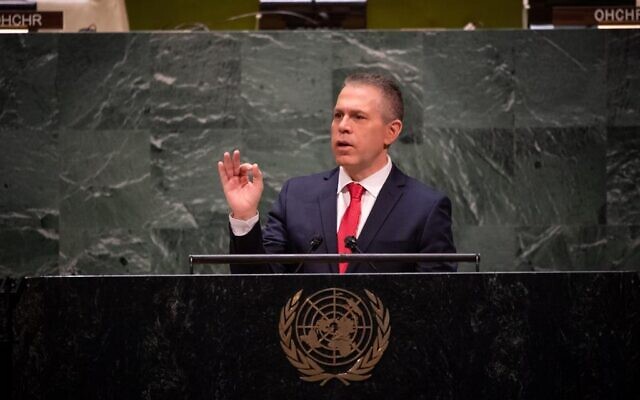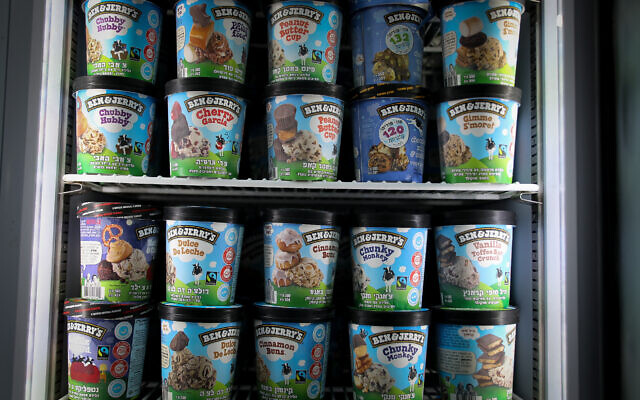State Department declines to weigh in on company’s settlements boycott, but reiterates opposition to BDS; kosher markets in the US drop the ice cream from shelves

Gilad Erdan, Israel’s ambassador to the United States and the United Nations, sent letters to the governors of the 35 US states that have enacted legislation against the Boycott, Divestment and Sanctions movement, requesting that they sanction Ben & Jerry’s over its recent decision to halt sales in West Bank settlements.
“I ask that you consider speaking out against the company’s decision, and taking any other relevant steps, including in relations to your state laws and the commercial dealings between Ben and Jerry’s and your state,” read the letter from Erdan, who said Tuesday he coordinated the move with Foreign Minister Yair Lapid.
The states that have passed anti-BDS legislation include Florida, Illinois, New York, New Jersey, California, Maryland and Texas — but not Vermont, where Ben & Jerry’s is headquartered.
Erdan wrote that Israel views Ben & Jerry’s decision “very severely as it is the de-facto adoption of antisemitic practices and advancement of the de-legitimization of the Jewish state and the de-humanization of the Jewish people.”
The letter also claimed that such boycotts “significantly harm Palestinians as well,” many of whom shop in Israeli-owned stores in the West Bank.
On Monday, Ben & Jerry’s announced that it would no longer distribute its products in the “Occupied Palestinian Territory,” apparently referring to West Bank settlements and East Jerusalem.

It said the decision would take effect at the end of 2022, when its contract with the current Israeli manufacturer and distributor expires. The future of Ben & Jerry’s sales across Israel beginning in 2023 remains in question.
At a US State Department press briefing on Tuesday, spokesman Ned Price said he does not have “a reaction to offer regarding the actions of a private company” when asked about the situation, but reiterated that White House officials “firmly reject the BDS movement, which unfairly singles out Israel.”

Price added that the US “will be a strong partner in fighting efforts around the world that potentially seek to delegitimize Israel,” in a way that is “consistent with the First Amendment rights of the American people.”
Ben & Jerry’s Israel, a licensee of the Vermont-based company — which will continue to sell its products across Israel, including in West Bank settlements, until the end of 2022, and which resisted Ben & Jerry’s pressure to stop distributing to settlements — said its sales have risen since Monday’s announcement.
Ben & Jerry’s boycott policy will only come into force when its agreement with the local manufacturing and distribution licensee expires. The ice cream giant’s owner Unilever said it would continue to sell in Israel after that, but any new licensee would be vulnerable to civil action if it did not distribute to Israelis in the territories.
“I just want to say thank you to the hundreds of thousands of people who have been in contact to offer their support and their help,” said Ben & Jerry’s Israel CEO Avi Zinger in a video posted to social media on Tuesday evening. “And to the many of you who went and bought ice cream today, thank you, together we will beat BDS.”
The company said its sales on Tuesday were 21 percent higher than on an average day.
Meanwhile, a growing number of kosher supermarkets in the US — and around the world — announced that they would stop stocking Ben & Jerry’s products following the decision.
Morton Williams, a chain of 16 supermarkets in the New York City area, said it would reduce the Ben & Jerry’s products it sells by 70%, stop promoting them in its weekly circulars and display them in hard-to-find locations in its stores.
“This action is taken in response to Ben & Jerry’s boycott of Jewish communities that are at the center of a territorial dispute in Israel, including the Jewish Quarter of Jerusalem — inhabited by Jews for over 3,000 years,” the chain of supermarkets said in a statement.
Seasons, which has six stores in and around New York, said it would remove all Ben & Jerry’s products from its shops, stating: “We stand with Israel. Always.”
In Teaneck, New Jersey, home to a significant Jewish population, both Cedar Market and Glatt Express, as well as Grand & Essex in neighboring Bergenfield, New Jersey, said they would cease selling the ice cream.
Kosher Kingdom, located in Melbourne, Australia, said it would also stop selling Ben & Jerry’s and unload its remaining stock at a discount.
As reported by The Times of Israel
